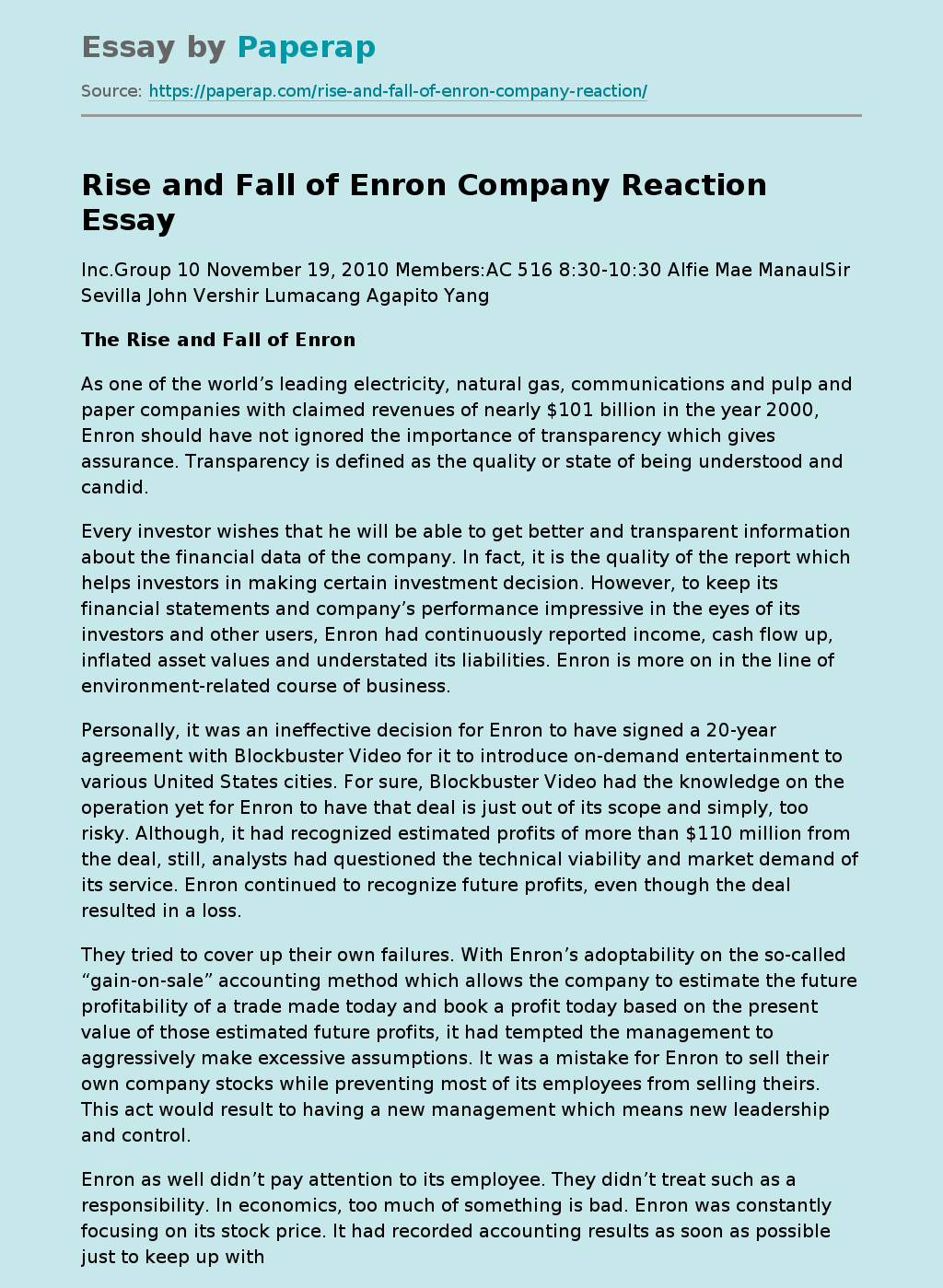Rise and Fall of Enron Company Reaction
Inc.Group 10 November 19, 2010 Members:AC 516 8:30-10:30 Alfie Mae ManaulSir Sevilla John Vershir Lumacang Agapito Yang
The Rise and Fall of Enron
As one of the world’s leading electricity, natural gas, communications and pulp and paper companies with claimed revenues of nearly $101 billion in the year 2000, Enron should have not ignored the importance of transparency which gives assurance. Transparency is defined as the quality or state of being understood and candid.
Every investor wishes that he will be able to get better and transparent information about the financial data of the company.
In fact, it is the quality of the report which helps investors in making certain investment decision. However, to keep its financial statements and company’s performance impressive in the eyes of its investors and other users, Enron had continuously reported income, cash flow up, inflated asset values and understated its liabilities. Enron is more on in the line of environment-related course of business.
Personally, it was an ineffective decision for Enron to have signed a 20-year agreement with Blockbuster Video for it to introduce on-demand entertainment to various United States cities.
For sure, Blockbuster Video had the knowledge on the operation yet for Enron to have that deal is just out of its scope and simply, too risky. Although, it had recognized estimated profits of more than $110 million from the deal, still, analysts had questioned the technical viability and market demand of its service. Enron continued to recognize future profits, even though the deal resulted in a loss.
They tried to cover up their own failures. With Enron’s adoptability on the so-called “gain-on-sale” accounting method which allows the company to estimate the future profitability of a trade made today and book a profit today based on the present value of those estimated future profits, it had tempted the management to aggressively make excessive assumptions. It was a mistake for Enron to sell their own company stocks while preventing most of its employees from selling theirs. This act would result to having a new management which means new leadership and control.
Enron as well didn’t pay attention to its employee. They didn’t treat such as a responsibility. In economics, too much of something is bad. Enron was constantly focusing on its stock price. It had recorded accounting results as soon as possible just to keep up with the company’s stock price which had helped ensure deal-makers and executives, for them, to receive large cash bonuses and stock options. It was a mistake for Enron to continuously think of protecting their company’s reputation and the compensation although their business began to perform poorly.
Conflict of interest is one of which that could possibly corrupt the motivation for an act in the other. Who would not love money? Of course, everyone does. Enron’s auditor firm, Arthur Andersen, was accused of applying reckless standards in their audits because of a conflict of interest over the significant consulting fees generated by Enron. The auditors’ methods were questioned as either being completed solely to receive its annual fees or for their lack of expertise in properly reviewing Enron’s revenue recognition, special entities, derivatives, and other accounting practices.
Due to the fall of Enron, it had brought into question the accounting practices and activities of many corporations throughout the United States and became a factor in the creation of the Sarbanes–Oxley Act of 2002. Thus, government regulations and rules need to be updated for the new economy. Character is destiny. As what Andre Maurois had said, “If you create a habit, you create a character. If you create a character, you create a destiny. ” Therefore, in business, there shall be no room for arrogance.
Rise and Fall of Enron Company Reaction. (2019, Nov 27). Retrieved from https://paperap.com/rise-and-fall-of-enron-company-reaction/

